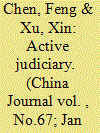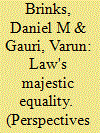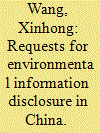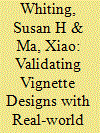| Srl | Item |
| 1 |
ID:
111302


|
|
|
| 2 |
ID:
132975


|
|
|
|
|
| Publication |
2014.
|
| Summary/Abstract |
While many find cause for optimism about the use of law and rights for progressive ends, the academic literature has long been skeptical that courts favor the poor. We show that, with the move toward a robust "new constitutionalism" of social and economic rights, the assumptions underlying the skepticism do not always hold. Our theories must account for variation in the elite bias of law and litigation. In particular, we need to pay closer attention to the broad, collective effects of legal mobilization, rather than focusing narrowly on the litigants and the direct benefits they receive. We support the claim by showing that litigation pursued in legal contexts that create the expectation of collective effects is more likely to avoid the potential anti-poor bias of courts. On the other hand, policy areas dominated by individual litigation and individualized effects are more likely to experience regressive outcomes. Using data on social and economic rights cases in four countries, we estimate the potential pro-poor impact of litigation by examining whether the poor are over- or under-represented among the beneficiaries of litigation. We find that the impact of courts is positive and very much pro-poor in India and South Africa, and slightly negative in Indonesia and Brazil. Overall, we challenge the tendency in the literature to focus on the direct effects of litigation, find that the results of litigation are more positive for the poor than the conventional wisdom would lead us to expect, and offer an explanation that accounts for part of the variation while raising a number of questions for future research.
|
|
|
|
|
|
|
|
|
|
|
|
|
|
|
|
| 3 |
ID:
143782


|
|
|
|
|
| Summary/Abstract |
This article analyzes the fairly recent phenomenon of citizens and organizations requesting disclosure of environmental information in China. Chinese citizens and organizations are invoking the new open government information regulations to push government agencies, particularly environmental protection agencies, to fulfill their legal obligation of information disclosure. By requesting that government agencies disclose environmental information, citizens and organizations have turned themselves into active agents pushing forward the implementation of the new regulations. The findings of this article suggest that a bottom-up legal mobilization in the field of environmental information disclosure, though still with a limited scope, has been happening and endeavoring to make social and political changes in China. Furthermore, this legal mobilization can be seen as an important part of emerging civil society activities in contemporary China.
|
|
|
|
|
|
|
|
|
|
|
|
|
|
|
|
| 4 |
ID:
179294


|
|
|
|
|
| Summary/Abstract |
How well do vignette designs capture actual behaviour in the real world? This study employs original survey data featuring both hypothetical vignettes and behavioural questions in order to assess the external validity of descriptive and causal inferences in survey experiments. The survey was conducted in a three-province, probability-proportional-to-size sample of 1,897 rural residents in China and focuses on the legal mobilization of citizens in response to grievances involving land rights. In terms of descriptive inference, we find that relative to the behavioural benchmark, hypothetical vignettes significantly over-estimate legal mobilization in response to a grievance, particularly for higher-cost actions like petitioning the government and litigating in court. We find that data from hypothetical vignettes affect causal inference as well, producing significantly different results regarding the effect of political connections and legal knowledge on legal mobilization. The study makes a contribution by identifying conditions under which hypothetical vignettes are less likely to produce valid inference. It engages a rich literature on disputing and legal mobilization in the field of Chinese politics and helps to resolve debates over the role of political connections and legal knowledge.
|
|
|
|
|
|
|
|
|
|
|
|
|
|
|
|